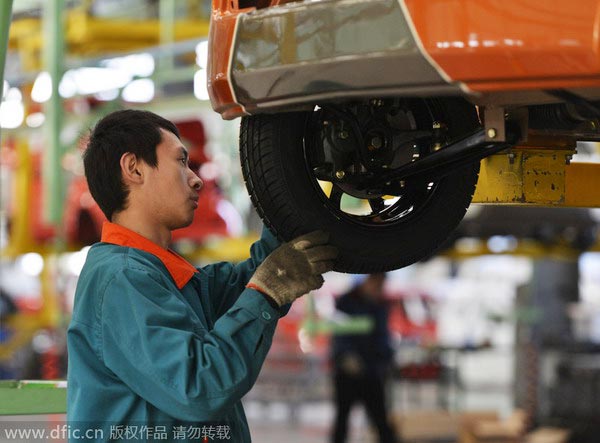Curtain rises on industry's way forward
Updated: 2015-03-26 07:23
By ZHAO YINAN(China Daily)
|
|||||||||||
Ten key sectors backed by govt to transform China into a competitive player on global stage
 |
|
A Chinese worker assembles a new energy car on the assembly line at an auto plant in Zouping county, East China's Shandong province, Dec 16, 2014. [Photo/IC] |
China's ambitious plans to upgrade its manufacturing power in the next 10 years were unveiled at a meeting of the State Council on Wednesday.
Chaired by Premier Li Keqiang, an executive meeting of the council announced that government support, including special funding and tax incentives, will focus on 10 industrial sectors capable of transforming the nation into a more competitive player globally.
The program, "Made in China 2025", was first mentioned by Li in his Government Work Report to lawmakers at the annual session of the National People's Congress at the start of this month.
The program is viewed by Chinese economists and industrial leaders as the nation's answer to "Industry 4.0", a concept about the future for industry that was first featured in a German government high-tech strategy in 2013.
In a statement released after Wednesday's meeting, the government demanded "concrete results in key fields".
It called for greener, more intelligent manufacturing, with an emphasis on quality and adapting well to the trend of being increasingly integrated with the Internet.
The government said it will draw up a list to include industrial sectors that will be given development priority, stating how they can be upgraded further. The list will be subject to adjustment if required.
The meeting described China's industrialization as "uncompleted", with manufacturing industry remaining the foundation of the economy.
The initiative to upgrade the nation from a big manufacturer to a manufacturing industry superpower is key to helping China maintain economic growth at a medium-to-high level and to move up the global value chain.
China has become the world's second-largest economy by producing enormous amounts of consumer products and selling them overseas. But the days of double-digit growth in manufacturing output have gone, stemming from inefficient traditional methods and a lack of high-end manufacturing.
Domestic manufacturing fell to its lowest point in nearly a year this month, according to the HSBC flash manufacturing Purchasing Managers Index.
Related Stories
China approves three new free trade zones 2015-03-25 09:22
China eases market access to boost investment 2014-11-26 16:31
China urges further opening, innovation of economic zones 2014-11-21 17:09
Cabinet to issue list of approved business charges 2014-06-27 07:06
China unveils policy to boost creative industry 2014-03-14 17:39
Today's Top News
Cockpit voice recorder of crashed airliner found, probe under way
Queen approves new coin for birth of second baby of Prince William
House passes resolution urging Obama to send arms to Ukraine
WHO denies politics swayed Ebola emergency declaration
Greek, German leaders seek to reboot relationship
Austria says receives no demand of ransom from IS
Lee remembered as 'old friend' of Chinese people
ChemChina to buy tire maker Pirelli
Hot Topics
Lunar probe , China growth forecasts, Emission rules get tougher, China seen through 'colored lens', International board,
Editor's Picks

|

|

|

|

|

|





